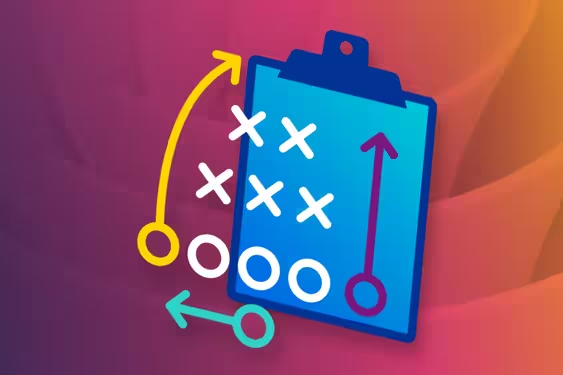Leading a sales team through the ever-changing landscape of B2B sales can feel like you’re riding an unrelenting wave—one minute you’re up, and the next you’re down.
With the constant addition of new technologies, new competitors, and an unstable macro-environment, B2B sellers face a host of rising challenges. Today, everything a buyer needs to know is readily available online, so many prefer a frictionless, low-touch (and often rep-free) buying experience. In fact, a Gartner study found that B2B buyers spend only 17% of the total purchase journey with sales reps.[1]
Additionally, buyer groups are increasing in size and complexity. The average buyer group now includes 11 stakeholders, and can even span all the way up to 20 different decision-makers.[2] Large buyer groups then directly impact the length of sales cycles. According to Forrester, the average sales cycle now typically lasts 4+ months.[3]
Luckily, a technology generating a lot of buzz across the industry can also be a sales leader’s life ring in an overwhelming sea of data. Using Generative AI, sales leaders are able to effectively create a culture of coaching across the entire sales org, driving high performance and high outputs.
GenerativeAI – The Sales Leader’s Coaching Life Ring
Regardless of these new challenges, one thing hasn’t changed for sales leaders—they need to produce results, quarter after quarter. In order to do so, sales leaders need to create a culture of coaching across their entire sales org. Leaders and managers need access to accurate data that allows them to give data-backed, individualized, and actionable feedback to their reps. As sales cycles and buyer groups grow larger than ever, People.ai’s AI-powered insights ensure reps, managers, and leaders can approach each deal with agility and flexibility.
During a recent launch of People.ai’s Account GPT (and soon-to-be-launched Engagement GPT) we asked three superstar sales leaders to talk about how they drive coaching within their sales orgs.
Jill Brown, North American VP of Sales at People.ai, Jonathan Buckle, VP of Americas Sales at Black Box, and Joel Semmelhack, VP of Midwest Enterprise Sales at Okta, shared the ways that they’ve created a culture of sales coaching within their teams using People.ai. Check out the full event here!
Here’s a brief summary of the key ways these sales leaders are coaching their teams through the wild waves of today’s B2B sales landscape.
1. Ensure the entire sales org is running on the same metrics, the same rhythm, and the same cadence.
Sales leaders should drive alignment across the organization by ensuring that each manager has access to the same data and playbook to lead their teams. Each team needs to be aligned to a consistent set of metrics that are used to measure performance and coach reps. That way, reps know what is expected of them and how their performance is being measured, and managers know which levers they can coach to in order to increase outputs.
People.ai helps capture all GTM engagements in CRM and populates a simple, user-friendly interface to visualize across accounts, opportunities, and teams. This gives every person in the GTM org, from CRO to AE, access to equal data that can be used to quickly review and easily improve the performance of the entire org. People.ai analyzes up to two years of the team’s historical data to help identify the appropriate benchmarks for every stage of the sales process. From there, leaders and managers can understand the exact activities required to get a deal done and coach sellers accordingly.
2. Create a supportive culture of individualized coaching.
A sales culture in which reps feel they can be open and honest is crucial to continued success. Sales leaders should focus on creating a supportive culture where reps know they can ask for help and will be given support and guidance. As Jonathan Buckle, VP of Americas Sales at Black Box, mentioned in the product launch event, nobody should ever get thrown under the bus. Instead, focus on how reps can improve, and an increase in bookings will follow.
People.ai gives leaders and managers detailed, individualized insights so they’re able to deliver data-driven feedback specific to each rep by account, opportunity, or stage. People.ai’s engagement dashboards allow you to create custom metrics that matter to your GTM motion and use AI to surface the relevant information a manager needs to get to understand individual performance and overall pipeline health. Once AI insights are surfaced, it’s recommended the manager address any issues in a 1:1—because people work for people.
3. Coach constantly, not just informal reviews.
One way that leaders can create a supportive environment is by making sure that reps receive helpful coaching consistently, and not just in mid-year performance reviews or QBRs.
With Engagement GPT, People.ai’s AI sales assistant, leaders receive insights around accounts, opportunities, team, and individual performance - in seconds! Engagement GPT serves up key takeaways, identifies deals or accounts that are at risk, and lets users know when leading indicators are trending in the wrong direction. Managers can now easily coach on an ongoing basis—not just in formal settings. That way, reps and managers can work together to ensure each opportunity has a clear, actionable path to closed-won.
Ride the Wave to Better Coaching
Ready to learn how Account GPT and Engagement GPT can help you, your managers, and your reps conquer the waves that make up today’s digital selling world? Schedule a demo to see how you can leverage AI to create a culture of actionable, data-driven coaching in your sales org.
[1]The Future of Sales: Digital-First Sales Transformation Strategies
Related Insights
Explore more expert insights on AI adoption, sales execution, and revenue intelligence to help your team close more deals with confidence.



